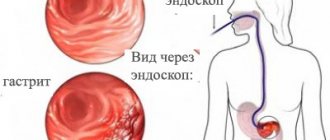- Outpatient department
Outpatient department » - Gastroenterology
Gastroenterology »
- About the direction
About the direction »
- Gastritis: symptoms, diagnosis and treatment
Gastritis is perhaps the most common disease of the gastrointestinal tract. Almost every second resident of our country suffers from it. That is why it is so important to know the first signs and symptoms of this disease in order to start treatment on time and not neglect your health.
Gastritis (from the Latin gastritis, from the ancient Greek γαστήρ (gaster) - “stomach” + -itis inflammatory or inflammatory-dystrophic changes in the mucous membrane) is a collective concept that is used to refer to various inflammatory and dystrophic changes in the gastric mucosa. Damage to the mucous membrane can be primary, considered as an independent disease, caused by poor nutrition, and secondary, caused by other infectious and non-infectious diseases or intoxication.
Types of gastritis
Acute gastritis
In modern medicine, there are several types of acute gastritis:
Simple (catarrhal) gastritis develops as a result of ingestion of stale food contaminated with pathogenic microbes (foodborne toxic infection), rotavirosis, allergies, or as a result of damage to the gastric mucosa by medications. With catarrhal gastritis, the surface layer of the mucous membrane is destroyed, which is quickly restored after the cessation of the irritating factor.
Corrosive (erosive) gastritis. This type of gastritis develops after concentrated acids or alkalis enter the stomach, which corrode the gastric mucosa. In this case, not only the superficial, but also the deep layers of the gastric mucosa are destroyed, so this form of the disease often gives rise to peptic ulcers or the formation of scars.
Phlegmonous gastritis is a purulent inflammation of the stomach that can develop as a result of penetration of a foreign object (for example, a fish bone) into the stomach wall with subsequent infection of this area. A distinctive feature of this type of gastritis is high fever and unbearable pain in the epigastric region. Phlegmonous gastritis requires immediate surgical intervention, as it can develop into peritonitis (extensive inflammation of the abdominal organs) and be fatal.
Fibrinous gastritis. It occurs very rarely against the background of sepsis (blood poisoning).
With proper treatment, acute gastritis (depending on the form) lasts up to 5 - 7 days, but complete recovery of the stomach occurs much later.
Often acute gastritis can become chronic.
Chronic gastritis
Chronic gastritis can develop as a consequence of acute gastritis or as an independent disease. Its danger lies in the fact that it can occur for a long time without showing any symptoms.
In the development of the disease, as a rule, there are periods of exacerbation and remission. During periods of exacerbation of chronic gastritis, short-term attacks of pain, discomfort in the upper abdomen, a feeling of heaviness, nausea after eating, and heartburn may appear, which indicates a dysfunction of the natural “valves” of the stomach and the reflux of acidic stomach contents into the esophagus.
A characteristic feature of chronic gastritis is the gradual growth of connective tissue in the gastric mucosa, replacing the cells that produce gastric juice (atrophy of the gastric mucosa). Chronic gastritis is often accompanied by a decrease in the production of gastric juice and acid (hypoacid gastritis).
Helicobacter pylori infection, which parasitizes the stomach, disrupts the renewal processes of the mucous membrane; thus, when old cells die, new ones cannot be formed. This leads to gradual degradation of the gastric mucosa with loss of function of the glands that produce gastric juice.
Complications
Without treatment, acute or chronic gastritis can cause a variety of complications. Some negative consequences of the pathology can threaten the patient's life.
Possible complications of gastritis:
- Ulcerative lesions of the stomach and small intestine.
- Gastrointestinal bleeding. Symptoms of this complication include pale skin, weakness, sweating, dizziness and low blood pressure.
- Perforation of the organ wall with the risk of extensive inflammation.
- Megaloblastic anemia, manifested by weakness, constant fatigue and dizziness.
- Malignant neoplasm of the stomach.
Dangerous negative consequences of acute inflammation can occur within several days.
Causes of gastritis
The main causes of gastritis are:
- poor nutrition;
- hasty eating and poorly chewed food or dry food;
- eating food that is too hot or too cold;
- eating savory foods (mostly spicy and highly salted);
- smoking;
- alcohol consumption;
- stress;
- infection with the microbe Helicobacter pylori;
- chewing gum on an empty stomach.
Harm and benefits of Helicobacter
Important! H. pylori does not always lead to gastritis and can be beneficial for our body. In recent years, the positive effect of these bacteria on the functioning of the immune system has been proven. H. pylori is able to interact with T lymphocytes, suppressing inflammation, and reducing the risk of developing allergies and asthma.
Other types of gastritis include:
- Autoimmune (15% of cases). Caused by aggression of the body's own antibodies, attacking the cells responsible for the secretion of acid in the stomach. This form of gastritis is characterized by increased pH levels and constant release of the hormone gastrin, which leads to the formation of microtumors in the stomach,
- Chemical (10% of cases). Caused by the action of various drugs (acetylsalicylic acid, non-steroidal anti-inflammatory drugs, antibacterial and other drugs) that irritate the gastric mucosa or reduce its protective properties,
- Reflux gastritis (5% of cases). They develop if bile enters the stomach. The cause of reflux gastritis can be inflammation of the duodenum or surgery to remove part of the stomach,
- Special forms (less than 1%). These include Crohn's disease, radiation, eosinophilic and other types of gastritis.
Important! The development of hCG is facilitated by the absence of teeth, foci of chronic infection in the oral cavity and pharynx (caries, inflamed tonsils), smoking, excessive alcohol consumption, stress, serious injury or surgery.
There are many classifications of gastritis: by localization (gastritis of the body of the stomach, antrum of the stomach, fundus of the stomach, pangastritis), by the degree of tissue damage (superficial, gastritis with damage to the glands without atrophy, atrophic, hypertrophic gastritis).
Symptoms of gastritis
So, how can you recognize that you have begun to develop gastritis? It is worth listening to your body and analyzing why pain bothers you, at what time it occurs and how often it happens.
Symptoms of gastritis:
- abdominal pain: sharp paroxysmal or constant painful;
- nausea is constant or intermittent, often occurring immediately after eating;
- heartburn;
- belching with a sour smell;
- repeated vomiting (in the case of acute gastritis, vomiting with blood is possible, since internal bleeding may open in the stomach);
- increased salivation;
- sometimes dry mouth;
- bowel dysfunction: constipation or diarrhea;
- from the whole body: severe general weakness, dizziness, headache, sweating, increased temperature, decreased blood pressure, increased heart rate - tachycardia;
- decreased appetite;
- unpleasant taste in the mouth;
- feeling of heaviness in the stomach after eating;
- bloating, rumbling in the stomach, flatulence;
- anemia, brittle and dry hair, split nails.
How is acidity level determined?
The main acid found in the stomach and determining its acidity level is hydrochloric acid. It is produced by parietal cells. The alkaline components of gastric juice neutralize hydrochloric acid. They are produced by accessory cells of the mucosa. The two substances interact and the acidity level changes throughout the day.
You can find out its level using intragastric pH-metry. To do this, a thin probe with a measuring electrode is placed into the patient's stomach. It gradually moves deeper and shows the pH in different areas of the organ.
In the part of the stomach where acid is produced, in an adult patient the pH should be from 1.6 to 2.0, and in the zone of alkali production and acid quenching - up to 5.2.
The doctor also pays attention to the symptoms. With high acidity, the patient suffers from heartburn, belching and a burning sensation in the throat; with low acidity, the patient suffers from bloating, flatulence and bad breath.
Diagnosis of gastritis
Today, the main way to determine gastritis is fibrogastroduodenoendoscopy or FGDS, which consists of studying the condition of the inner surface of the stomach using a probe, as well as a biopsy - removing a small fragment of tissue for examination.
FGDS makes it possible not to confuse gastritis and ulcer and to determine the type of disease: erosive or non-erosive.
Also, a gastroenterologist, to make a correct diagnosis, may prescribe the following tests:
- General blood analysis.
- Fecal occult blood test.
- Histological examination of a biopsy specimen of the gastric mucosa.
- Cytological examination of a biopsy specimen of the gastric mucosa.
- Two tests for the determination of H. pylori.
- Blood chemistry.
- General urine analysis.
Treatment of the disease
In order to get rid of gastritis, the specialist prescribes:
- antibiotics whose action is aimed at Helicobacter pylori;
- antacids to neutralize hydrochloric acid and for pain relief;
- drugs to block the production of hydrochloric acid and heal the gastric mucosa.
In the case of an autoimmune process, immunosuppressants and corticosteroids can be used. In any case, the patient is recommended to give up bad habits, eat a healthy diet, and avoid stressful situations.
At the first signs of gastritis, do not wait for self-healing, make an appointment with a gastroenterologist. Ignoring the symptoms can lead to gastritis becoming chronic and causing serious consequences. Multidisciplinary medical specialists are always ready to help you.
Our clinic is equipped with the necessary medical equipment for diagnosing diseases, and our center employs experienced specialists. Timely prescribed treatment and a completed course of drug therapy will allow you to forget about the disease forever or significantly increase periods of remission.
Diet for gastritis
For gastritis with low acidity
Can:
- boiled lean meat: chicken, rabbit;
- meat broths;
- lean fish: pink salmon, hake, cod;
- vegetables in the form of puree or grated: carrots, potatoes, green peas, beets;
- ground fruits, compotes and jelly from apples, raspberries and strawberries;
- porridge (oatmeal, semolina, rice);
- low-fat cottage cheese, milk;
- only squeezed cabbage juice;
- alkaline mineral waters, for example Borjomi (1 glass an hour before meals).
It is forbidden:
- hot and spicy dishes;
- canned food;
- mustard;
- pepper;
- onion;
- hot sauces.
For gastritis with high acidity
Can:
- pureed vegetarian soups;
- dairy products;
- lean fish and boiled meat;
- scrambled eggs;
- porridge, jelly, jelly;
- vegetable purees;
- compotes from fresh (not sour) fruits;
- carrot juice;
- White bread.
It is forbidden:
- coffee and strong tea;
- meat broths;
- smoked meats;
- mustard;
- onion;
- garlic.
For all types of gastritis, split meals are very important - 5-6 times a day.
Gastritis (from the Latin gastritis, from the ancient Greek γαστήρ (gaster) - “stomach” + -itis inflammatory or inflammatory-dystrophic changes in the mucous membrane) is a collective concept used to refer to inflammatory and dystrophic changes in the gastric mucosa of different origins and course. Damage to the mucous membrane can be primary, considered as an independent disease (due to poor nutrition), and secondary, caused by other infectious and non-infectious diseases or intoxication.
Gastritis is perhaps the most common disease of the gastrointestinal tract. Almost every second resident of our country suffers from it.
If you are really looking for your doctor...
Forecast
As a rule, the prognosis for gastritis is positive. Among patients who only go to doctors, many people do not experience any symptoms.
Treatment of any chronic disease is a long-term struggle with varying success. A chronically ill person cannot stay in the hospital for the entire period of illness. Life conditions are constantly changing, and success in treatment depends on this. A key role can be played by a meeting with a truly professional and competent doctor who is willing and able to find and eliminate the cause of the disease.
Helicobacter pylori
In the second half of the 20th century, a previously unknown factor was identified, which today is considered one of the first places in the etiology of chronic gastritis. Helicobacter pylori is a spiral-shaped gram-negative bacterium that infects various areas of the stomach and duodenum. Many cases of gastric and duodenal ulcers, gastritis, duodenitis, and possibly some cases of gastric lymphoma and gastric cancer are etiologically associated with Helicobacter pylori infection. The successful experience with self-infection of one of the discoverers of the role of Helicobacter pylori in the development of diseases of the stomach and duodenum - Barry Marshall and a group of volunteers served as convincing evidence of this theory. In 2005, Barry Marshall and his colleague Robin Warren were awarded the Nobel Prize in Medicine for their discovery.
However, the majority (up to 90%) of infected Helicobacter pylori carriers do not show any symptoms of disease. Not every chronic gastritis has a bacterial cause.






